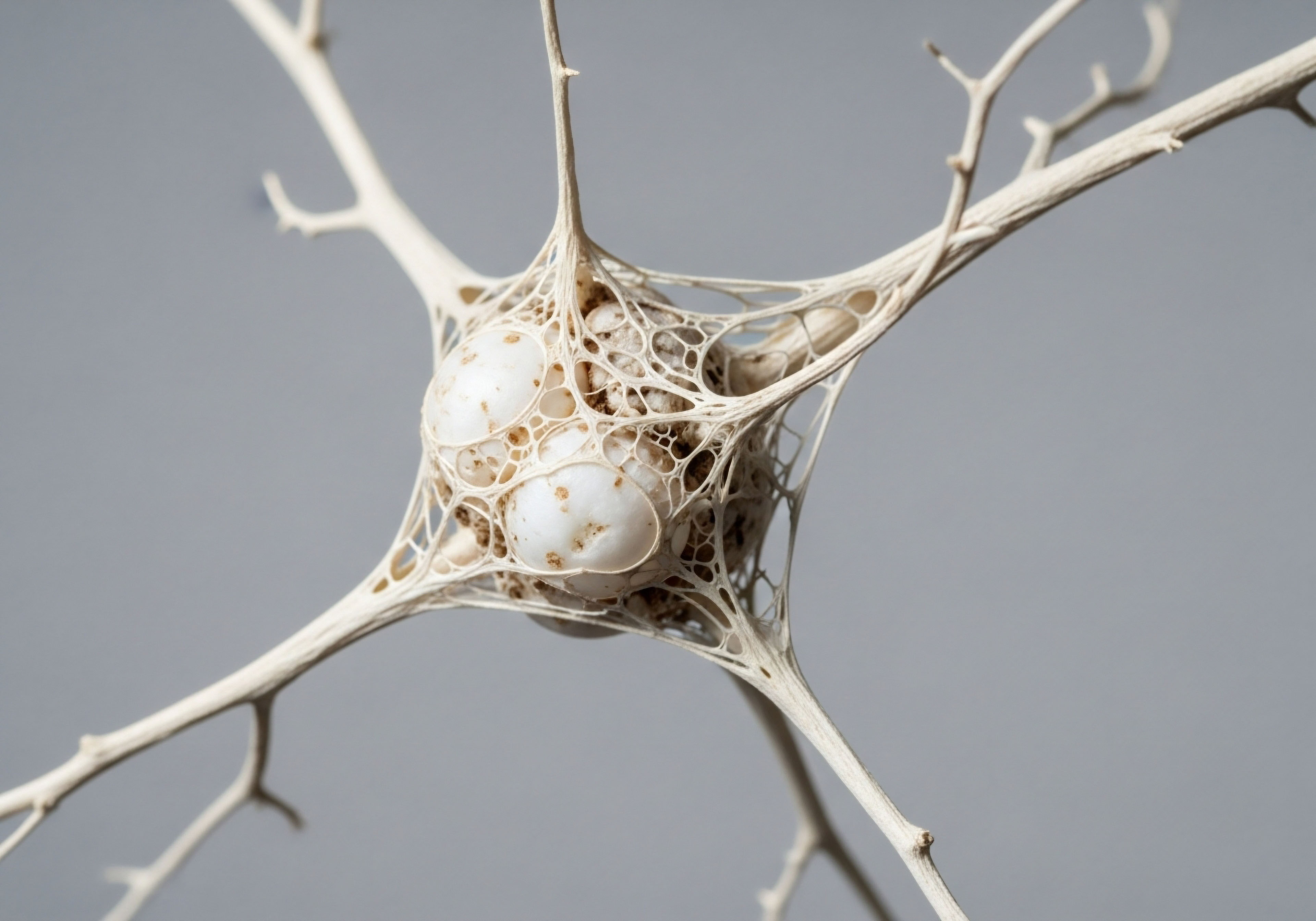

Fundamentals
Perhaps you have experienced moments where your thoughts feel less sharp, or recalling a name or a fact seems to take more effort than it once did. This sensation, often described as a subtle cognitive shift, can be unsettling, prompting questions about what might be happening within your biological systems.
It is a common human experience to notice changes in mental acuity, and these shifts frequently connect to the intricate balance of our endocrine system. Understanding these connections is the first step toward reclaiming mental clarity and overall vitality.
Our bodies operate through a complex network of chemical messengers, and among the most influential are hormones. These substances act as vital signals, orchestrating countless physiological processes, from metabolism and mood to reproductive function and, critically, brain activity. When this delicate hormonal equilibrium is disrupted, whether by natural life stages or medical interventions, the effects can ripple throughout the entire system, including our cognitive abilities.
One class of medications that significantly alters hormonal balance is Gonadotropin-Releasing Hormone (GnRH) agonists. These agents are designed to suppress the production of sex hormones, such as testosterone and estrogen, by acting on the hypothalamic-pituitary-gonadal (HPG) axis.
The HPG axis functions like a sophisticated internal communication system, where the hypothalamus releases GnRH, which then signals the pituitary gland to release luteinizing hormone (LH) and follicle-stimulating hormone (FSH). These gonadotropins, in turn, stimulate the gonads (testes in men, ovaries in women) to produce sex steroids.
GnRH agonists initially cause a temporary surge in LH and FSH, but with continuous administration, they desensitize the pituitary’s GnRH receptors, leading to a profound suppression of LH, FSH, and consequently, sex hormone levels.
The intentional reduction of sex hormones, while therapeutically beneficial for certain conditions, introduces a new set of considerations for brain function. Sex hormones are not solely involved in reproduction; they are also powerful modulators of brain health and cognitive performance.
Estrogen, for instance, has widespread receptors in brain regions vital for memory, such as the hippocampus, and supports neuronal health and synaptic connections. Testosterone also plays a significant role in cognitive domains, including attention, spatial abilities, and memory, with receptors distributed throughout the brain.
GnRH agonists, by suppressing sex hormone production, can influence cognitive functions that rely on the balanced presence of these essential biochemical messengers.
When GnRH agonists induce a state of profound sex hormone deficiency, the brain’s environment changes. This can affect various aspects of mental processing. The impact on cognitive domains is a subject of ongoing clinical investigation, yet evidence suggests specific areas are more susceptible to these hormonal shifts.

How Hormonal Balance Influences Brain Function
The brain, a highly metabolically active organ, relies on a steady supply of various signaling molecules to maintain its complex operations. Hormones, particularly sex steroids, act as key regulators in this intricate system. Their influence extends to ∞
- Neurogenesis ∞ The creation of new neurons, particularly in areas like the hippocampus, which is vital for learning and memory.
- Neuronal Survival ∞ Protecting existing brain cells from damage and supporting their longevity.
- Synaptic Plasticity ∞ The ability of synapses, the connections between neurons, to strengthen or weaken over time in response to activity. This is the biological basis of learning and memory.
- Neurotransmitter Regulation ∞ Influencing the levels and activity of chemical messengers like serotonin, dopamine, and acetylcholine, which govern mood, attention, and cognitive processing.
A disruption in sex hormone levels, therefore, can alter these fundamental processes, leading to noticeable changes in cognitive performance. The body’s systems are interconnected, and a shift in one area, such as the endocrine system, inevitably affects others, including the delicate neural networks responsible for our thoughts and memories.


Intermediate
Understanding the foundational role of sex hormones in brain health sets the stage for examining how GnRH agonists, by design, alter this delicate balance. These medications are powerful tools in clinical practice, employed for specific therapeutic objectives where suppressing gonadal steroid production is advantageous. Conditions such as prostate cancer, endometriosis, uterine fibroids, and central precocious puberty often warrant the use of GnRH agonists to halt the growth of hormone-sensitive tissues or to delay pubertal development.
The mechanism by which GnRH agonists achieve their therapeutic effect is through continuous stimulation of the GnRH receptors in the pituitary gland. Unlike the natural pulsatile release of GnRH from the hypothalamus, which is essential for maintaining pituitary sensitivity, the constant presence of an agonist leads to receptor desensitization and downregulation.
This effectively creates a “medical castration” state, significantly reducing circulating levels of testosterone in men and estrogen in women. It is this profound reduction in sex steroid hormones that underpins many of the observed cognitive effects.

Which Cognitive Domains Are Affected?
Clinical observations and research studies have consistently pointed to several cognitive domains that appear particularly susceptible to the hormonal changes induced by GnRH agonists. These include ∞
- Memory Function ∞ This is perhaps the most frequently reported area of concern. Patients often describe difficulties with learning new information, retaining recent events, and verbal recall. Both verbal memory and spatial memory have been identified as potentially impaired.
- Executive Function ∞ This broad category encompasses higher-level cognitive processes such as planning, problem-solving, decision-making, and cognitive flexibility. Individuals may experience a reduced ability to organize tasks, manage time, or adapt to new situations.
- Attention and Concentration ∞ Sustaining focus on a task, shifting attention appropriately, and avoiding distractions can become more challenging. This manifests as a feeling of “brain fog” or reduced mental sharpness.
- Visuospatial Abilities ∞ Some studies suggest impairments in tasks requiring the ability to perceive and manipulate objects in space, or to understand spatial relationships.
The impact on these domains can vary among individuals, influenced by factors such as age, baseline cognitive status, duration of treatment, and the specific underlying condition being addressed. For instance, older cancer survivors may experience more pronounced cognitive changes.
GnRH agonist therapy can lead to measurable changes in memory, executive function, and attention, reflecting the brain’s reliance on balanced sex hormone signaling.

Connecting GnRH Agonist Effects to Hormonal Optimization
The effects of GnRH agonists highlight the critical role of sex hormones in maintaining optimal brain function. This understanding provides a compelling contrast to the goals of personalized wellness protocols, such as Testosterone Replacement Therapy (TRT) for men and women, and other hormonal optimization strategies. While GnRH agonists aim to suppress sex hormone production for specific medical reasons, hormonal optimization protocols seek to restore physiological levels of these vital compounds to support overall well-being, including cognitive health.
For men experiencing symptoms of low testosterone, often termed andropause, TRT protocols typically involve weekly intramuscular injections of Testosterone Cypionate. This is frequently combined with Gonadorelin to help maintain natural testosterone production and fertility, and Anastrozole to manage estrogen conversion. The aim is to alleviate symptoms such as reduced cognitive sharpness, mood changes, and low libido, which can arise from declining testosterone levels.
Similarly, for women navigating peri-menopause or post-menopause, where estrogen and testosterone levels naturally decline, hormonal balance protocols may include subcutaneous injections of Testosterone Cypionate and Progesterone. These interventions address symptoms like irregular cycles, mood fluctuations, hot flashes, and cognitive concerns such as memory and focus issues, which are often linked to hormonal shifts. The distinction is clear ∞ one approach intentionally reduces hormones for disease management, while the other carefully calibrates them for systemic health and vitality.
The following table illustrates the contrasting objectives and outcomes related to cognitive function ∞
| Aspect | GnRH Agonist Therapy | Hormonal Optimization Protocols |
|---|---|---|
| Primary Goal | Suppress sex hormone production for disease management. | Restore physiological sex hormone levels for systemic health. |
| Hormonal State Induced | Profound hypogonadism (very low estrogen/testosterone). | Balanced, healthy sex hormone levels. |
| Cognitive Impact | Potential for impaired memory, executive function, attention. | Support for cognitive clarity, memory, and mood. |
| Underlying Mechanism | Reduced neuroprotection, altered neurotransmission due to hormone deficiency. | Enhanced neurogenesis, synaptic plasticity, balanced neurotransmission. |

How Do GnRH Agonists Influence Neurotransmitters?
Beyond the direct effects of sex hormone deprivation, GnRH agonists can indirectly influence the delicate balance of neurotransmitters within the brain. Neurotransmitters are the chemical messengers that transmit signals across synapses, governing everything from mood and sleep to learning and memory. The GnRH system itself is deeply interconnected with various neurotransmitter pathways.
For example, the GnRH neurons interact with monoamines like serotonin and dopamine, as well as GABA and neuropeptide Y. Changes in sex hormone levels can alter the synthesis, release, and receptor sensitivity of these neurotransmitters. A reduction in estrogen, for instance, can affect serotonin pathways, which are crucial for mood regulation and cognitive flexibility.
Similarly, testosterone influences dopamine pathways, which are central to motivation, reward, and executive function. The systemic impact of GnRH agonists extends beyond simple hormone levels, creating a cascade of effects on the brain’s chemical signaling.


Academic
The discussion of GnRH agonists and their cognitive implications requires a deep dive into the neurobiological underpinnings of hormonal action within the central nervous system. The brain is not merely a passive recipient of hormonal signals; it actively synthesizes and metabolizes steroids, creating a localized environment of neurosteroids that profoundly influence neuronal excitability and synaptic function. GnRH agonists, by disrupting the primary gonadal hormone production, indirectly affect this intricate neurosteroidogenic machinery and the broader neurochemical landscape.

Neurobiological Mechanisms of Cognitive Alteration
The cognitive changes observed with GnRH agonist therapy stem from complex interactions at the cellular and molecular levels. Sex steroid hormones, particularly estrogen and testosterone, exert their influence through specific receptors located in various brain regions. The hippocampus, a structure vital for learning and memory, and the prefrontal cortex, which governs executive functions, are particularly rich in these receptors. When these receptors are deprived of their ligands due to GnRH agonist action, a cascade of neurobiological alterations can ensue.
One significant mechanism involves the modulation of neurotransmitter systems. Estrogen, for example, plays a role in regulating cholinergic neurons in the basal forebrain, which are critical for attention and memory. Reduced estrogen levels can impair acetylcholine release, a neurotransmitter strongly linked to cognitive processes. Similarly, testosterone influences dopaminergic and serotonergic systems, affecting mood, motivation, and cognitive control. The disruption of these finely tuned neurotransmitter balances contributes to the reported cognitive complaints.
Another layer of complexity involves neuroinflammation and oxidative stress. Hormonal imbalances can disrupt the delicate balance between free radicals and antioxidants, leading to oxidative stress, which damages neuronal cells and impairs mitochondrial function. This cellular damage can reduce synaptic plasticity, the very foundation of learning and memory. Furthermore, chronic inflammation, often influenced by hormonal status, can negatively impact brain health and contribute to cognitive decline.
The GnRH system itself, beyond its pituitary effects, has direct neuromodulatory roles in the central nervous system. GnRH receptors are found in extra-pituitary regions, including the hippocampus and other limbic structures. The pulsatile release of GnRH is crucial for maintaining myelination and synaptic plasticity. Therefore, the continuous, non-pulsatile stimulation by GnRH agonists might not only suppress gonadal hormones but also directly interfere with the brain’s intrinsic GnRH signaling, potentially contributing to cognitive changes.
The cognitive impact of GnRH agonists extends beyond simple hormone deficiency, involving complex alterations in neurotransmitter systems, neuroinflammation, and direct GnRH signaling within the brain.

Long-Term Cognitive Trajectories
The long-term cognitive trajectory following GnRH agonist therapy is a subject of ongoing research and clinical debate. Some studies suggest that cognitive impairments, particularly in memory, may persist even after discontinuation of treatment. This raises important questions about the potential for permanent neurobiological changes, especially when treatment occurs during critical periods of brain development, such as puberty.
Conversely, other studies, particularly in specific populations like children treated for precocious puberty, have not consistently found long-term negative effects on overall intelligence quotient (IQ) or cognitive functioning in early adulthood. However, subtle deficits in specific domains, such as spatial memory, have been observed to persist. This variability underscores the need for personalized assessment and careful monitoring of cognitive function in individuals undergoing GnRH agonist therapy.
The duration of treatment appears to be a significant factor, with longer exposure to androgen deprivation therapy (ADT) linked to increased severity of cognitive effects. This suggests a cumulative impact on brain health. The reversibility of these effects upon cessation of therapy is not always complete, particularly for certain cognitive domains, highlighting the importance of considering the full spectrum of potential outcomes.

Implications for Personalized Wellness Protocols
The detailed understanding of how GnRH agonists affect cognitive domains reinforces the rationale behind personalized wellness protocols that aim to optimize hormonal balance. While GnRH agonists are necessary for specific medical conditions, the insights gained from their cognitive side effects underscore the importance of supporting the endocrine system for overall brain health.
Protocols such as Growth Hormone Peptide Therapy, utilizing peptides like Sermorelin, Ipamorelin / CJC-1295, Tesamorelin, Hexarelin, and MK-677, aim to support cellular repair, metabolic function, and neuroprotection, which can indirectly benefit cognitive vitality. These peptides can influence growth hormone and IGF-1 pathways, which are known to have neurotrophic effects and support brain plasticity.
Similarly, other targeted peptides, such as Pentadeca Arginate (PDA), which is utilized for tissue repair, healing, and inflammation management, can contribute to a healthier neurobiological environment by reducing systemic inflammation that might otherwise compromise cognitive function. The comprehensive approach of personalized wellness seeks to address systemic imbalances that can impact brain health, contrasting with the targeted suppression achieved by GnRH agonists.
The following list summarizes key cognitive domains and their potential alterations under GnRH agonist therapy ∞
- Verbal Memory ∞ Difficulty recalling words, names, or recently learned verbal information.
- Spatial Memory ∞ Challenges with navigation, remembering locations, or spatial relationships.
- Working Memory ∞ Impaired ability to hold and manipulate information in mind for short periods.
- Processing Speed ∞ Slower mental processing, taking longer to complete cognitive tasks.
- Attentional Control ∞ Reduced ability to focus, sustain attention, or divide attention between tasks.
- Cognitive Flexibility ∞ Difficulty switching between tasks or adapting to new rules or situations.

Can Hormonal Recalibration Aid Cognitive Function?
The question of whether restoring hormonal balance can mitigate or reverse cognitive changes is central to personalized wellness. The brain’s capacity for plasticity suggests that supporting optimal hormonal environments, even after periods of deficiency, could yield benefits. For instance, the careful application of hormonal optimization protocols aims to re-establish the neuroprotective and neurotrophic effects of sex steroids.
This involves not just achieving specific hormone levels, but also considering the balance between different hormones, such as the estrogen/testosterone ratio, which may be important for optimal cognitive outcomes.
The goal of personalized wellness is to recalibrate the body’s internal messaging system, supporting the brain’s inherent capacity for health and function. This involves a precise, data-driven approach to hormonal balance, recognizing that each individual’s biological system responds uniquely.

References
- Khan, A. J. et al. “A Systematic Review on the Potential Acceleration of Neurocognitive Aging in Older Cancer Survivors.” MDPI, 2021.
- Nelson, C. J. et al. “Cognitive Effects of Hormone Therapy in Men With Prostate Cancer ∞ A Review Editorial Comment.” ResearchGate, 2017.
- Mul, D. et al. “Cognition, Health-Related Quality of Life, and Psychosocial Functioning After GH/GnRHa Treatment in Young Adults Born SGA.” Oxford Academic, 2018.
- Duff, S. J. & Hampson, E. “Estrogens and androgens in the prefrontal cortex ∞ Relevance for cognition and decision-making.” Hormones and Behavior, 2000.
- Kocoska-Maras, L. “Testosterone and estrogen treatment in postmenopausal women ∞ aspects on behavior and cognitive function.” KI Open Archive, 2011.
- Brinton, R. D. et al. “Neurosteroid Actions in Memory and Neurologic/Neuropsychiatric Disorders.” Frontiers in Neuroendocrinology, 2015.
- Mayo, W. et al. “Neurosteroids ∞ Deficient cognitive performance in aged rats depends on low pregnenolone sulfate levels in the hippocampus.” PNAS, 1993.
- Purdy, R. H. et al. “Neurosteroids ∞ fine tuning of brain function.” British Society for Neuroendocrinology, 2019.
- Majewska, M. D. et al. “Neurosteroids and GABA-A Receptor Function.” Frontiers in Neuroendocrinology, 1990.
- Micevych, P. E. & M. L. M. M. Sinchak. “The roles of GnRH in the human central nervous system.” Frontiers in Neuroendocrinology, 2019.
- Barabás, K. & Szabó-Meleg, E. “Mechanisms of Reciprocal Regulation of Gonadotropin-Releasing Hormone (GnRH)-Producing and Immune Systems ∞ The Role of GnRH, Cytokines and Their Receptors in Early Ontogenesis in Normal and Pathological Conditions.” MDPI, 2020.
- Patel, K. & S. B. Khan. “Physiology, Gonadotropin-Releasing Hormone.” StatPearls, 2023.
- Choi, S. & Hwang, S. W. “GnRH peripherally modulates nociceptor functions, exacerbating mechanical pain.” Frontiers in Molecular Neuroscience, 2024.
- A. L. Hirschberg, et al. “A reduction in long-term spatial memory persists after discontinuation of peripubertal GnRH agonist treatment in sheep.” Psychoneuroendocrinology, 2017.
- Li, Y. et al. “Influence of Gonadotropin Hormone Releasing Hormone Agonists on Interhemispheric Functional Connectivity in Girls With Idiopathic Central Precocious Puberty.” Frontiers in Human Neuroscience, 2020.

Reflection
As you consider the intricate interplay between hormones and cognitive function, particularly in the context of GnRH agonists, a deeper appreciation for your own biological systems may take root. The journey toward understanding your body is a personal one, marked by unique responses and individual needs. Knowledge of these complex mechanisms is not merely academic; it is a powerful tool for self-advocacy and informed decision-making about your health.
Recognizing the profound impact of hormonal balance on mental acuity can shift your perspective from simply managing symptoms to actively supporting systemic vitality. This understanding empowers you to ask more precise questions, to seek out protocols that align with your body’s natural rhythms, and to pursue a path that truly honors your well-being. Your biological system possesses an inherent intelligence, and aligning with it is key to reclaiming your full potential.

What Steps Can You Take Next?
Armed with this information, consider what feels most relevant to your personal health journey. Perhaps it is a conversation with a clinician about your hormonal status, or a deeper exploration into how personalized wellness protocols might support your cognitive and overall health goals. The insights shared here serve as a starting point, a foundation upon which to build a more comprehensive understanding of your unique physiology.
Your body communicates with you through symptoms and sensations. Learning to interpret these signals, informed by scientific understanding, allows for a more proactive and precise approach to health. The path to optimal function is often a process of careful calibration, guided by both clinical data and your lived experience.



